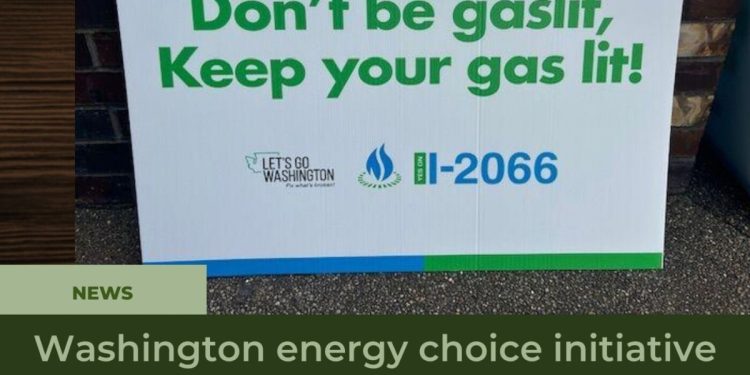On Tuesday afternoon, supporters of Initiative 2066 submitted over 431,000 signatures to the Secretary of State’s Office in Tumwater. Their goal is to have the measure, which aims to safeguard energy options such as natural gas and propane, included on the ballot for November.
On Tuesday, the Building Industry Association of Washington and Let’s Go Washington, along with other partners, organized two news conferences. One was held at noon in Redmond while the other was at SOS headquarters at 3 p.m. The purpose was to present the collected signatures.
Brian Heywood, the founder of Let’s Go Washington voter advocacy organization, announced at a recent event that Initiative 2066 has gathered 431,063 signatures. The initiative aims to prevent the state from enforcing a natural gas ban.
As the rolling carts were loaded with over 18 boxes of signed petitions, a small group of supporters cheered on. The boxes were then wheeled inside for further verification.
To qualify, registered voters in Washington must submit 324,516 valid signatures as per state law. This figure is determined by the number of votes cast during the previous gubernatorial election.
To ensure that an initiative qualifies for the ballot, it is advised that sponsors submit a higher number of petition signatures. This is because some signatures may be invalid due to duplication or non-registration. A cushion of 15% to 20% above the required number of signatures is usually enough to compensate for any discrepancies and increase the chances of qualifying for the ballot.
Jessie Simmons from Olympia Master Builders announced to The Center Square that he is submitting additional petition signatures ahead of the Tumwater press conference. These signatures have not yet been counted in the tally.
Simmons reported that all the signatures were collected on the same day, with people bringing them to the office. The organization also held some successful signing events where they were able to gather a few hundred signatures. The response has been overwhelming.
According to Heywood, exceeding the target of 430,000 signatures within a 44-day timeframe was an achievement that he had not thought was possible. He also revealed that there are plans to submit additional petitions before the Friday deadline for signature submission.
Heywood explained that they conducted a poll which revealed that 80% of the people were against the ban, while 10% supported it, and another 10% were uncertain. He stated that this information made him aware that the ban was a winning issue.
It is crucial for proponents to have a strong and effective messaging strategy leading up to the November vote. The opposition is well-funded and will undoubtedly campaign against the measure, making it all the more important to get the messaging right. As the speaker emphasized, this is a critical time for proponents to communicate their message clearly and effectively.
“Their tactic would involve gaslighting and denying the fact that the bill is essentially a ban, but the legislation explicitly requires PSE to devise a geographical electrification strategy that would eliminate the areas where natural gas is not currently available.”
In reference to the legislation passed and signed into law this session, Puget Sound Energy now has the authority to plan for a transition away from natural gas, as per House Bill 1589. This bill has led to the proposal of I-2066 for the upcoming November ballot.
Heywood confidently stated that the message they aim to convey is that I-2066 will effectively prevent the ban from happening regardless of what 1589 had intended to do. He added that if one supports the use of natural gas and does not want it to be banned, then they should also support I-2066.
In his statement, he emphasized that this move is a pre-emptive strike to ensure that natural gas is not banned or made too expensive to be practically unusable. He stated, “You are not going to ban natural gas or make it so expensive that it’s a de facto ban.”
There are three initiatives backed by Republicans that voters will decide on this November. The first one seeks to repeal the Climate Commitment Act, while the second one would give Washington workers the option to opt out of the state’s long-term care program. The third initiative aims to repeal the state’s capital gains tax.










